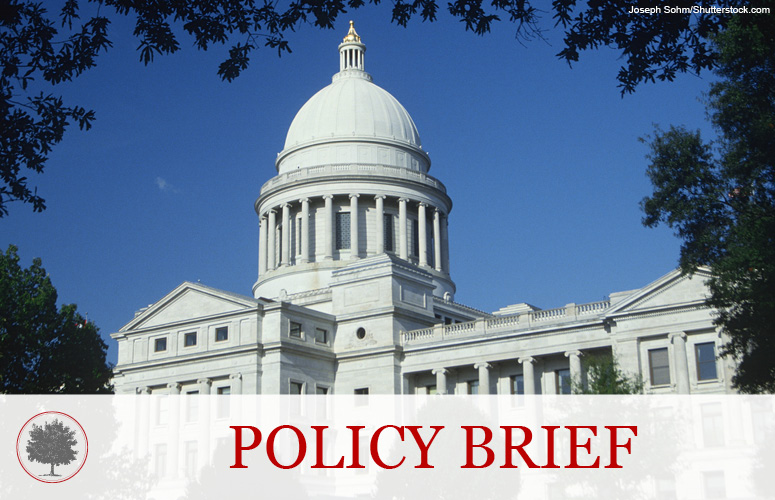Can Arkansas Escape from Medicaid Expansion if the Federal Government Breaks Its Commitments?
Apr 16, 2013
By Robert Alt and Dan Greenberg
Despite a failed vote yesterday on HB 1219, Arkansas House members are likely to have another bite at the apple today on funding the “private option.” Lawmakers have spent a substantial amount of time this session creating and designing this particular version of Medicaid expansion, which would funnel Medicaid payments through private insurance companies. Legislators who must choose whether to fund Medicaid expansion (whether it is labeled the private option or not) should understand that a central argument made in expansion’s favor is groundlessly overconfident.
More precisely, the advocates of the private option version of Medicaid expansion have explained that, if their plan does not work as expected (if, for instance, the federal government fails to make good on its future commitments), then Arkansas can always exit the expansion and return to the previous status quo. Unfortunately, private-option advocates have ignored both statutes and case law when explaining that Arkansas can always check out of the private option if the federal government fails to meet its funding commitments. Advocates of the private option therefore make a fundamental mistake when they explain that Medicaid expansion can risklessly be explored or casually exited; in fact, there is substantial reason to believe that when a state chooses Medicaid expansion, it is something like a decision to go down a one-way street.
As one of us recently explained when testifying before the Ohio General Assembly, there is in fact a substantial legal question as to whether a state can exit Medicaid expansion after entering it. Of course, as a literal matter, a state can always end its Medicaid program completely; the question at issue here is whether a state, after expansion, can revert to its pre-expansion status without jeopardizing all Medicaid funds.
In the Obamacare case, NFIB v. Sebelius, the Supreme Court explained that the federal government cannot condition the first dollar of existing Medicaid coverage upon a state’s decision whether to opt into Medicaid expansion; however, the Court did not say that those constraints upon the federal government would not apply after a state has opted into the expansion. Instead, the Court emphasized that changes made by Obamacare were unforeseeable to the states, and that it would therefore be problematic to hold the states to conditions that they could not have anticipated changing. Notably, however, the prospect of the federal government changing a match rate is foreseeable enough that seven Justices joined opinions acknowledging the possibility that match rates could change, leaving a significant burden on the states. In responding to assertions of relative modest cost increases for the states, three Justices cautioned that such a claim not only ignores increased administrative expenses, but also assumes that the Federal Government will continue to fund the expansion at the current statutorily specified levels. It is not unheard of, however, for the Federal Government to increase requirements in such a manner as to impose unfunded mandates on the States.
This concern was echoed in an opinion joined by four Justices, which emphasized that “costs may increase in the future because of the very real possibility that the Federal Government will change funding terms and reduce the percentage of funds it will cover. This would leave the States to bear an increasingly large percentage of the bill.” The upshot of all this is that if Arkansas (or another Medicaid expansion state) came back to court demanding that the federal government uphold its previous bargain, it would not be surprising for the Court to respond “We warned you.” Under this scenario, the Court would presumably look to the federal statute at issue as a binding contract, and would base its analysis on § 1396 of the Social Security Act. That section, which remains fully in force, gives the Secretary of Health and Human Services the discretion to withhold all Medicaid funding if a state fails to comply with Medicaid requirements.
Therefore, if Arkansas tried to exit expansion after the federal government failed to meet its commitments, there is a substantial possibility that a court could find that the Secretary of Health and Human Services has the legal authority to condition first-dollar federal Medicaid spending on the state’s continuation in the expanded program. To put it bluntly: under this scenario, expansion is forever. Private-option boosters are free to point to the triggers in a private-option bill, but they have misunderstood how state legislation works if they think it trumps federal law and Supreme Court precedent.
It’s the lawyer’s job to attempt to predict what courts will do, and to alert clients to the realistic alternate scenarios that courts might create. Unfortunately, the argument of private-option advocates that Arkansas can easily get out of expansion whenever it wants to is so casual as to be reckless. Predicting how courts will respond to novel legal questions is an inherently uncertain business; the Supreme Court’s guidance in this area, however, suggests that ignoring the possibility of permanent, locked-in expansion is a mistaken (and highly unconservative) approach. Although court decisions rarely provide perfect guidance about how they will rule in the future, legislators are mistaken to ignore the possibility that expansion cannot be abandoned as easily as it was entered.
Robert Alt, currently the President of the Buckeye Institute in Ohio, previously taught law at Ashland University and Case Western Reserve University. Dan Greenberg, a lawyer and former state legislator, is President of the Advance Arkansas Institute.
